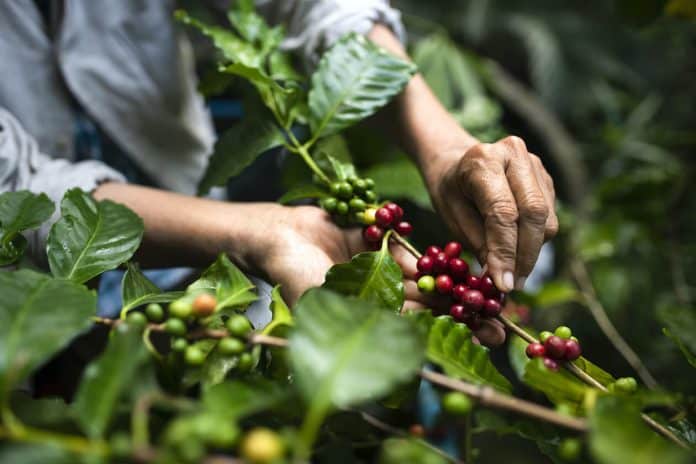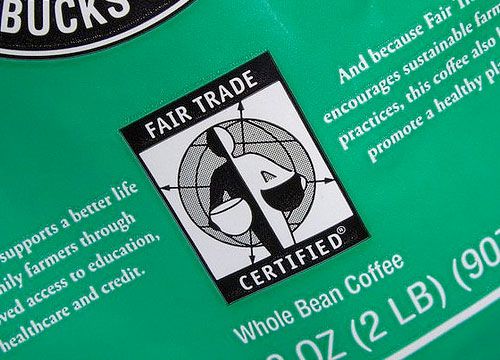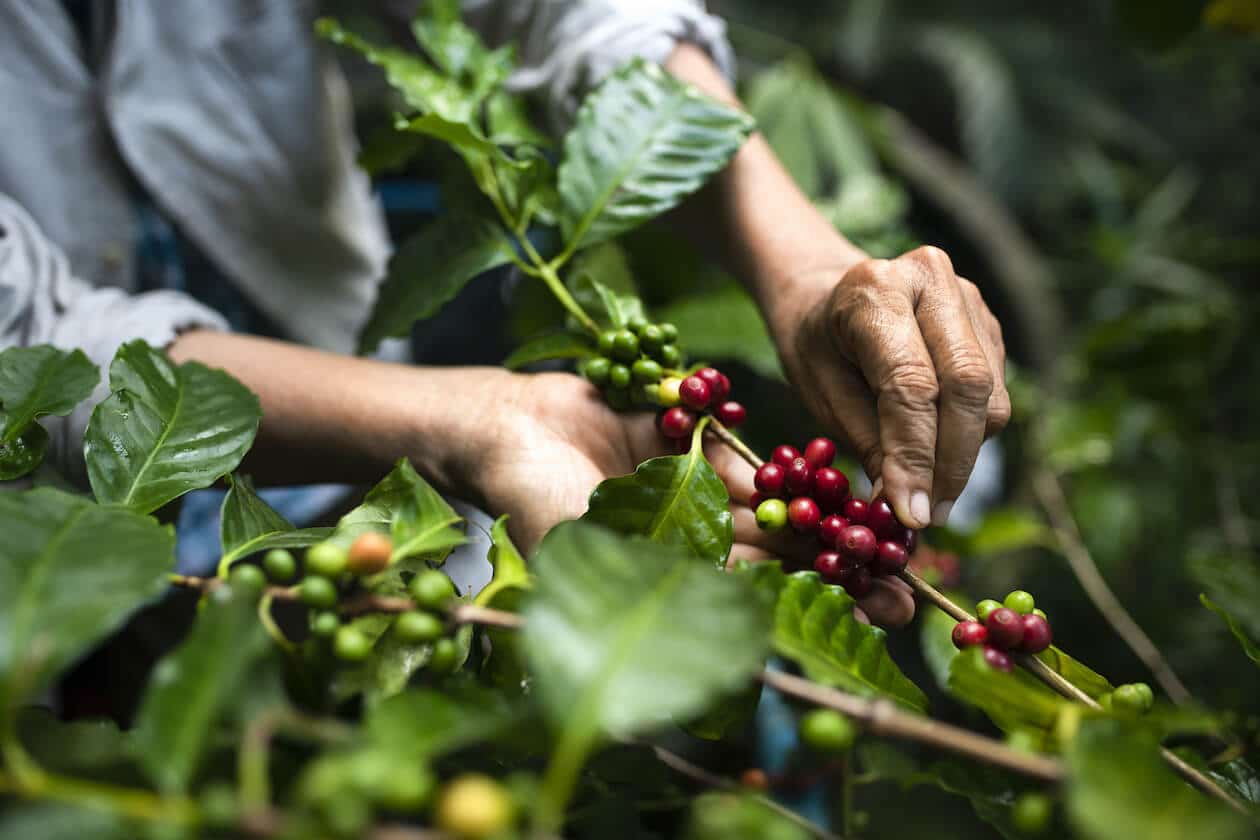In the world of coffee, terms like “fair trade” and “organic” are often thrown around, but what do they really mean when we’re buying our morning brew? When it comes to fair trade coffee, it means that the farmers who grow the beans are paid fairly for their work, ensuring ethical practices and better working conditions. On the other hand, organic coffee refers to beans that are grown without the use of harmful pesticides and chemical fertilizers. Understanding the meanings of these labels can help us make more informed choices when it comes to our coffee consumption.

What Does ‘Fair Trade’ Mean When Buying Coffee?
Definition of Fair Trade
When we talk about buying coffee that is labeled as ‘fair trade’, it means that the beans have been produced and traded according to specific standards that aim to ensure fair treatment for coffee farmers and workers. Fair trade is a system that prioritizes social and economic justice by guaranteeing a fair price for the coffee beans, promoting safe and healthy working conditions, and supporting sustainable farming practices. It is a movement that seeks to address the inequalities and exploitation often faced by farmers in the coffee industry.
Fair Trade Certification
In order for coffee to be labeled as fair trade, it must go through a certification process. There are several fair trade certification organizations, such as Fairtrade International and Fair Trade USA, that set the standards and criteria for fair trade coffee. These organizations work closely with coffee farmers and cooperatives to ensure compliance with fair trade principles.
Fair trade certification is a rigorous and comprehensive process. It involves auditing the entire supply chain, from the farmers who grow the coffee beans to the exporters, importers, and retailers. The certification verifies that fair trade standards have been met, including fair prices for farmers, safe and healthy working conditions, and responsible environmental practices.
Benefits of Fair Trade Coffee
Choosing fair trade coffee has numerous benefits for all stakeholders involved. For coffee farmers, fair trade provides a stable and predictable income, as they receive a fair price for their beans that covers their production costs. This helps to alleviate poverty and supports the economic development of farming communities. Fair trade also ensures that farmers are able to invest in their farms and improve their agricultural techniques, leading to higher-quality coffee beans.
Fair trade practices not only benefit farmers but also have a positive impact on the wider community. By guaranteeing fair wages and safe working conditions, fair trade encourages social responsibility and contributes to the well-being of coffee farm workers. Fair trade premiums, an additional amount paid on top of the fair price, are often invested in community development projects such as education, healthcare, and infrastructure.
Impact on Farmers and Communities
The impact of fair trade on farmers and communities cannot be overstated. By participating in fair trade, farmers have the opportunity to improve their livelihoods and break free from the cycle of poverty. Fair trade promotes inclusivity and empowers small-scale farmers, particularly women, who often face additional challenges and discrimination in the coffee industry.
Fair trade also fosters a sense of community and solidarity among farmers. By organizing themselves into cooperatives or associations, farmers can collectively negotiate better prices, access resources, share knowledge, and support each other. This strengthens their position in the coffee industry and promotes sustainable development.
What Does ‘Organic’ Mean When Buying Coffee?
Definition of Organic
When we choose to buy organic coffee, we are opting for beans that have been produced without the use of synthetic fertilizers, pesticides, or genetically modified organisms (GMOs). Organic coffee farming practices prioritize the use of natural and environmentally friendly methods to nurture healthy coffee plants and protect the surrounding ecosystems.
Coffee farmers who adhere to organic farming practices aim to minimize their impact on the environment and prioritize the long-term health of their crops and surrounding ecosystems. They rely on organic fertilizers, crop rotation, shade trees, and natural pest control methods to maintain the health and fertility of their soil. By avoiding the use of harmful chemicals, organic coffee farming promotes biodiversity and supports the conservation of natural resources.
Organic Certification
In order to be labeled as organic, coffee must adhere to strict certification standards. There are various organic certification bodies, such as the United States Department of Agriculture (USDA) and the European Union Organic Certification, that ensure compliance with organic farming principles.
Organic certification involves a thorough inspection of the entire coffee production process, from farming practices to processing and packaging. It verifies that no synthetic chemicals or GMOs have been used and that the coffee has been handled and stored separately from non-organic products. This guarantees transparency and accountability in the organic coffee supply chain.
Benefits of Organic Coffee
Choosing organic coffee has a range of benefits, both for consumers and the environment. From a health perspective, organic coffee is free from harmful chemical residues that can potentially be present in conventionally grown coffee. By opting for organic, we can enjoy our daily cup of coffee knowing that it is free from synthetic pesticides and other potentially harmful substances.
Organic coffee farming also has significant environmental advantages. By avoiding the use of synthetic chemicals, organic farmers protect the soil, water sources, and biodiversity of their farms. The absence of chemical fertilizers and pesticides reduces water pollution, prevents soil degradation, and supports the natural habitats of local flora and fauna.
Environmental Impact
The environmental impact of organic coffee farming extends beyond individual farms. The focus on biodiversity and ecosystem preservation contributes to the overall health and resilience of our planet. By promoting sustainable farming practices, organic coffee farming helps combat climate change, promote soil conservation, and protect water resources. This is particularly important in coffee-growing regions, where the delicate balance of ecosystems can be easily disrupted by unsustainable agricultural practices.
Fair Trade vs Organic: What’s the Difference?
Certification Processes
The certification processes for fair trade and organic coffee differ in terms of their specific requirements and the organizations involved. Fair trade certification focuses on ensuring fair prices and working conditions for farmers, while organic certification emphasizes the use of natural and environmentally friendly farming methods.
Fair trade certification involves auditing the entire supply chain and verifying compliance with fair trade principles, such as fair prices, safe working conditions, and community development. Organic certification, on the other hand, focuses on the specific farming practices used to grow the coffee beans, ensuring that no synthetic chemicals or GMOs are used.
Criteria for Certification
The criteria for fair trade certification and organic certification are distinct but complementary. Fair trade certification sets standards for fair prices, cooperative organization, democratic decision-making, and community development. It also prohibits child labor and promotes gender equality in the coffee industry.
Organic certification, on the other hand, focuses on the use of organic farming methods and the absence of synthetic chemicals. It sets guidelines for soil management, pest and disease control, seed selection, and post-harvest handling.
Commitment to Social Responsibility
Both fair trade and organic coffee represent a commitment to social responsibility, but they do so in different ways. Fair trade ensures that farmers receive a fair price for their beans, empowering them economically and socially. It also promotes safe and healthy working conditions and encourages community development.
Organic coffee, on the other hand, prioritizes environmental sustainability and the health of both farmers and consumers. By avoiding the use of synthetic chemicals, organic farmers protect the health of their soil, water, and surrounding ecosystems. This contributes to the overall well-being of farming communities and the planet.
Environmental Considerations
While both fair trade and organic coffee have environmental considerations, their focus differs. Fair trade certification does not specifically require organic farming practices, although many fair trade coffee producers also engage in organic farming. Fair trade focuses on empowering farmers economically and socially, while organic certification emphasizes the use of natural and environmentally friendly methods.
Choosing fair trade coffee supports sustainable farming practices and encourages environmentally responsible approaches among farmers. In contrast, opting for organic coffee directly supports the use of organic farming methods that prioritize the health of ecosystems and the conservation of natural resources.
Choosing Fair Trade and Organic Coffee
Reading Labels and Certifications
When selecting fair trade and organic coffee, it is important to be able to identify the relevant labels and certifications. Look for the fair trade symbol, such as the Fairtrade Certified logo or the Fair Trade USA logo, on the packaging. This ensures that the coffee has gone through the fair trade certification process and meets the standards set by the respective organization.
Similarly, for organic coffee, check for the organic certification logos, such as the USDA Organic seal, the European Union Organic Certification logo, or the certification emblem of the relevant organic certification body in your country. These logos guarantee that the coffee has been produced without the use of synthetic chemicals and GMOs, in accordance with organic farming principles.
Finding Fair Trade and Organic Brands
To find fair trade and organic coffee brands, start by visiting your local grocery store or specialty coffee shops. Many supermarkets now carry fair trade and organic coffee options, which are often clearly marked on the packaging. Specialty coffee shops may have a wider selection of fair trade and organic coffees, with knowledgeable staff who can provide more information and recommendations.
In addition, several online retailers specialize in selling fair trade and organic coffee. These retailers often offer a wide range of options from different regions and roasters, allowing you to explore different flavors and support various coffee farming communities around the world.
Supporting Sustainable Practices
Choosing fair trade and organic coffee goes beyond simply buying a product – it is a conscious decision to support sustainable practices within the coffee industry. By choosing these ethical and sustainable options, we directly contribute to the well-being of farmers, workers, and the environment.
Supporting fair trade helps ensure that farmers receive fair prices for their beans, making their livelihoods more sustainable and empowering them economically. It also supports the development of coffee-growing communities through initiatives such as education, healthcare, and infrastructure improvements.
By selecting organic coffee, we encourage environmentally friendly farming practices that protect soil health, conserve water resources, and promote biodiversity. This not only benefits the farmers and their surrounding ecosystems but also contributes to the global fight against climate change and environmental degradation.
The Importance of Fair Trade and Organic Coffee
Ensuring Fair Prices for Farmers
One of the primary reasons fair trade and organic coffee are important is that they ensure fair prices for farmers. In conventional coffee trading, farmers often receive prices that do not cover their production costs, trapping them in a cycle of poverty. Fair trade guarantees that farmers receive a fair and stable income, enabling them to invest in their farms, support their families, and improve their communities.
By paying fair prices, consumers who choose fair trade coffee play a vital role in breaking the cycle of poverty that plagues many coffee-growing regions. The fair trade system allows farmers to sell their coffee at prices that are not dictated by the volatile fluctuations of the international coffee market, providing them with stability and the opportunity for long-term sustainable development.
Improving Working and Living Conditions
Another important aspect of fair trade and organic coffee is the improvement of working and living conditions for farmers and workers. Fair trade standards require that farmers provide safe and healthy working conditions, ensuring that their employees are not exposed to harmful substances or labor exploitation.
Fair trade also prohibits the use of child labor and promotes gender equality within the coffee industry. By adhering to fair trade principles, coffee farmers and cooperatives contribute to the eradication of child labor and provide opportunities for women to participate equally in the decision-making and economic benefits of coffee production.
Promoting Sustainable Farming Practices
Promoting sustainable farming practices is a cornerstone of fair trade and organic coffee. With fair trade, farmers are encouraged, through fair prices and premiums, to invest in sustainable agriculture techniques that protect the environment and reduce the reliance on synthetic inputs.
Organic coffee farming takes sustainability a step further by explicitly requiring the use of natural and environmentally friendly farming methods. By removing synthetic chemicals from the equation, organic farmers prioritize soil health, conserve water resources, and preserve the biodiversity of their farms. This commitment to sustainable farming practices helps mitigate the negative impacts of conventional agriculture, such as soil degradation, water pollution, and loss of biodiversity.
Consumer Awareness and Education
The Power of Consumer Choices
Consumer awareness and education are critical when it comes to fair trade and organic coffee. The choices we make as consumers have the power to shape markets and influence the practices of coffee producers around the world. By actively seeking out and purchasing fair trade and organic coffee, we send a message to the industry that we value social and environmental responsibility.
Our consumer choices can create a demand for fair trade and organic coffee, encouraging more farmers to adopt these practices and invest in the necessary certifications. This, in turn, leads to greater economic stability, improved working conditions, and the conservation of natural resources in coffee-growing regions.
Breaking Down Labels and Certifications
Understanding the labels and certifications associated with fair trade and organic coffee is essential for making informed choices. Consumers should familiarize themselves with the different logos and certification bodies, such as Fairtrade International, Fair Trade USA, and USDA Organic, to ensure that the coffee they purchase meets the desired standards.
It is important to note that not all ethical and sustainable coffees carry certification labels. Some smaller-scale coffee producers may adhere to fair trade and organic principles but choose not to go through the formal certification process due to financial constraints. In such cases, it is advisable to look for other indicators of ethical and sustainable practices, such as direct trade relationships, transparency in the supply chain, and commitments to social and environmental initiatives.
Advocating for Ethical and Sustainable Practices
Consumer awareness goes beyond personal choices and can extend to advocating for broader industry-wide change. By sharing information with family, friends, and communities about fair trade and organic coffee, we can raise awareness and encourage others to make similar choices.
Supporting advocacy groups and organizations that work to promote fair trade and organic practices in the coffee industry is another powerful way to make a difference. These groups often engage in campaigns, lobbying efforts, and educational initiatives aimed at creating a more just and sustainable coffee industry.
The Future of Fair Trade and Organic Coffee
Trends and Market Growth
The demand for fair trade and organic coffee has been steadily growing over the years. As consumers become more conscious of the social and environmental impact of their choices, they are increasingly seeking out ethically and sustainably produced coffee.
This growing demand has led to an expansion in the fair trade and organic coffee market. More coffee producers are recognizing the value of fair trade and organic certifications and are actively seeking to meet the standards required. This trend has resulted in a wider variety of fair trade and organic coffee options available to consumers, catering to different tastes and preferences.
Challenges and Opportunities Ahead
While the fair trade and organic coffee movements have made significant progress, there are still challenges and opportunities ahead. One of the main challenges is ensuring that the fair trade and organic certifications remain credible and that the intended benefits reach farmers and communities. Ongoing monitoring and auditing are crucial to maintain the integrity of the certifications and address any potential issues.
Additionally, as the market for fair trade and organic coffee expands, it is important to ensure that smallholder farmers are not excluded or marginalized. Efforts should be made to support and empower these farmers, who often face additional barriers due to limited resources and access to markets.
The Role of Consumers and Industry Collaboration
Consumers play a vital role in shaping the future of fair trade and organic coffee. By continuing to prioritize ethical and sustainable practices, we can create a market that rewards and values these principles. Supporting brands and organizations that demonstrate a genuine commitment to fair trade and organic coffee can encourage other industry players to follow suit.
Industry collaboration is also crucial in driving positive change. When coffee companies, retailers, and certification bodies work together, they can collectively address issues and develop innovative solutions. Collaborative efforts can help streamline certification processes, improve transparency, and ensure that the benefits of fair trade and organic practices are realized by all stakeholders.
The Global Impact of Fair Trade and Organic Coffee
Global Economic and Social Justice
The impact of fair trade and organic coffee extends far beyond individual farmers and communities. By promoting fair prices and working conditions, fair trade contributes to global economic and social justice. It helps address inequalities in the coffee industry and provides opportunities for marginalized farmers to break free from poverty.
Fair trade also fosters a more equitable distribution of wealth and resources. By prioritizing cooperative models and democratic decision-making, fair trade allows farmers to have a stronger voice in the market and play an active role in shaping their own future. This shift in power dynamics promotes a more inclusive and just global economic system.
Environmental Protection and Conservation
The environmental benefits of fair trade and organic coffee are significant on a global scale. As mentioned earlier, organic farming practices prioritize the health of the soil, water, and surrounding ecosystems. By promoting sustainable agricultural practices, organic coffee contributes to the conservation of natural resources and supports biodiversity.
The environmental impact of fair trade coffee extends beyond organic farming practices. Fair trade encourages the adoption of responsible environmental practices, such as agroforestry, which promotes the planting of shade trees to protect coffee plants and provide habitat for wildlife. These practices help combat deforestation, reduce carbon emissions, and preserve fragile ecosystems.
Community Empowerment and Development
Fair trade and organic coffee have a profound impact on community empowerment and development. By investing fair trade premiums in community projects, coffee-producing communities can improve infrastructure, access education, and enhance healthcare services. These initiatives contribute to the social and economic development of communities, fostering a sense of pride and resilience.
Fair trade also promotes gender equality, an essential element of community empowerment. By actively involving women in all aspects of coffee production and decision-making, fair trade helps dismantle barriers and challenges traditional gender norms. This creates more inclusive and empowered communities.
How Fair Trade and Organic Coffee Affects the Coffee Industry
Influencing Supply Chains
Fair trade and organic coffee has a transformative effect on the coffee industry’s supply chains. By establishing fair prices and supporting cooperative models, fair trade empowers farmers and promotes a more balanced distribution of value along the supply chain. This challenges the traditional exploitative practices often associated with the coffee industry and encourages a more equitable and sustainable business model.
Organic coffee, with its emphasis on environmentally friendly farming practices, also drives positive change in the industry’s supply chains. The adoption of organic methods encourages farmers to prioritize soil health, water conservation, and biodiversity. This, in turn, promotes responsible sourcing practices and encourages transparency throughout the supply chain.
Supporting Smallholder Farmers
Smallholder farmers, who make up the majority of coffee producers worldwide, are often vulnerable to fluctuations in the coffee market. Fair trade and organic certifications provide these farmers with a lifeline, ensuring that they receive fair prices for their coffee and enabling them to invest in their farms and communities.
The fair trade system also supports smallholder farmers through cooperative models. By organizing themselves into cooperatives or associations, farmers can collectively negotiate better prices, access resources, and share knowledge. This collective approach strengthens their position in the industry and helps create a more sustainable and resilient future.
Sustainability in Coffee Production
Sustainability is a fundamental aspect of fair trade and organic coffee production. By emphasizing environmentally friendly farming practices, these certifications promote sustainable agriculture techniques that protect the health of ecosystems and conserve natural resources.
Fair trade and organic coffee cultivation often go hand in hand. Many fair trade coffee producers also engage in organic farming, recognizing the importance of minimizing their environmental impact and prioritizing the long-term health of their crops. This commitment to sustainability ensures that future generations of coffee farmers can continue to thrive and provides consumers with an eco-friendly and ethically sound choice.
Conclusion
Making informed and ethical choices when purchasing coffee is essential for promoting a fairer and more sustainable coffee industry. Understanding the meanings of fair trade and organic certifications allows us to support farmers and communities, protect the environment, and contribute to global economic and social justice.
By opting for fair trade coffee, we ensure that farmers receive fair prices for their beans, improve working and living conditions, and promote sustainable farming practices. Organic coffee, on the other hand, prioritizes natural and environmentally friendly farming methods, protecting soil health, conserving water resources, and preserving biodiversity.
Through our consumer choices, we have the power to shape the future of the coffee industry. By advocating for fair trade and organic practices, sharing information, and supporting brands that prioritize social and environmental responsibility, we can create a market that values the well-being of farmers, workers, and the planet.
Every cup of fair trade and organic coffee is an opportunity to make a positive impact – an opportunity to support sustainable practices, empower communities, and bring about lasting change. So let’s savor that cup of coffee, knowing that our choices have the power to make a difference.









































